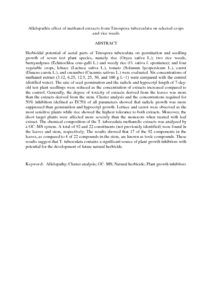Citation
Aslani, Farzad and Juraimi, Abdul Shukor and Ahmad Hamdani, Muhammad Saiful and Omar, Dzolkhifli and Alam, Md Amirul and Hashemi, Farahnaz Sadat Golestan and Hakim, Md Abdul and Uddin, Md. Kamal
(2014)
Allelopathic effect of methanol extracts from Tinospora tuberculata on selected crops and rice weeds.
Acta Agriculturae Scandinavica, Section B — Soil & Plant Science, 64 (2).
pp. 165-177.
ISSN 0906-4710; ESSN: 1651-1913
Abstract
Herbicidal potential of aerial parts of Tinospora tuberculata on germination and seedling growth of seven test plant species, namely rice (Oryza sativa L.); two rice weeds, barnyardgrass (Echinochloa crus-galli L.) and weedy rice (O. sativa f. spontanea); and four vegetable crops, lettuce (Lactuca sativa L.), tomato (Solanum lycopersicum L.), carrot (Daucus carota L.), and cucumber (Cucumis sativus L.) were evaluated. Six concentrations of methanol extract (3.12, 6.25, 12.5, 25, 50, and 100 g L−1) were compared with the control (distilled water). The rate of seed germination and the radicle and hypocotyl length of 7-day-old test plant seedlings were reduced as the concentration of extracts increased compared to the control. Generally, the degree of toxicity of extracts derived from the leaves was more than the extracts derived from the stem. Cluster analysis and the concentrations required for 50% inhibition (defined as EC50) of all parameters showed that radicle growth was more suppressed than germination and hypocotyl growth. Lettuce and carrot were observed as the most sensitive plants while rice showed the highest tolerance to both extracts. Moreover, the dicot target plants were affected more severely than the monocots when treated with leaf extract. The chemical composition of the T. tuberculata methanolic extracts was analyzed by a GC–MS system. A total of 92 and 22 constituents (not previously identified) were found in the leaves and stem, respectively. The results showed that 17 of the 92 components in the leaves, as compared to 4 of 22 compounds in the stem, are known as toxic compounds. These results suggest that T. tuberculata contains a significant source of plant growth inhibitors with potential for the development of future natural herbicide.
Download File
![[img]](http://psasir.upm.edu.my/36360/1.hassmallThumbnailVersion/Allelopathic%20effect%20of%20methanol%20extracts%20from%20Tinospora%20tuberculata%20on%20selected%20crops%20and%20rice%20weeds.pdf)  Preview |
|
PDF (Abstract)
Allelopathic effect of methanol extracts from Tinospora tuberculata on selected crops and rice weeds.pdf
Download (186kB)
| Preview
|
|
Additional Metadata
Actions (login required)
 |
View Item |

